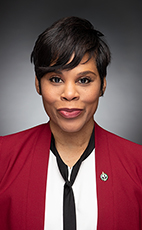Mr. Speaker, I rise today to speak about Motion No. 36, which seeks to designate August 1 of every year as emancipation day in Canada.
Motion No. 36 acknowledges that the British Parliament abolished slavery in the British Empire as of August 1, 1834, and that slavery existed in British North America prior to its abolition. In fact, Olivier Le Jeune was recorded as the first enslaved African to live in New France in the 1600s. Olivier's birth name is not known as he was taken from Africa as a young child and eventually given the last name of the priest who purchased him.
The Slavery Abolition Act ended slavery in the British Empire on August 1, 1834, and thus also in Canada. However, the first colony in the British Empire to have anti-slavery legislation was Upper Canada, now Ontario. Unfortunately, the act against slavery of 1793 did not free a single slave. It was superseded by the Slavery Abolition Act.
To better understand the anti-slavery legislation of 1793, we have to remember Chloe Cooley. Chloe was a young Black woman who was enslaved in Fort Erie in the late 1700s. Her owner forced her onto a boat across the Niagara River into the United States to sell her. This incident is believed to have led to the passage of the legislation of 1793 in Upper Canada that prevented enslaved people from being imported into the province.
Although the Slavery Abolition Act stopped slavery in the British colonies, it did not end in the American southern states. Up to 40,000 African American slaves tried to escape from the American south to freedom in the northern states or to Canada.
The Underground Railroad appeared in this context. It was not a railroad at all, but a complex clandestine network of people, including Blacks, fellow enslaved persons, white and indigenous sympathizers, Quakers, Methodists, Baptists, farmers, Americans and Canadians alike, who organized safe houses that helped enslaved men, women and children in southern plantations reach freedom in the north.
Between 1850 and 1860 alone, up to 20,000 slaves reached Upper Canada. It became the main terminus of the Underground Railroad. Black Canadians helped build strong communities and contributed to the development of the provinces where they settled. Some lived in all-Black settlements such as Elgin, Buxton, Queen's Bush and the Dawn settlement near Dresden, Ontario, as well as Birchtown and Africville in Nova Scotia.
They cultivated the land, built homes and raised families. Black people established religious, educational, social and cultural institutions, political groups and community building organizations. Two newspapers were also founded: The Voice of the Fugitive by Mary and Henry Bibb and Mary Ann Shadd Cary's The Provincial Freeman, making Cary the first Black woman in North America to edit a newspaper.
Through the ages, Black Canadians encountered various forms of discrimination. They were often relegated to certain jobs and denied the right to live in certain places due to their race. Parents were forced to send their children to segregated schools that existed in parts of Ontario and Nova Scotia. This is what historians call “residential segregation”.
People of African descent have shaped Canada's heritage and identity since the arrival of Mathieu Da Costa, a navigator and interpreter whose presence in Canada dates back to the early 1600s. However, the vital role of people of African descent has not always been viewed as such.
Inspired by these stories of courage and resilience, Black Canadians of a more recent past have made tremendous contributions to our society. Let me recall some notable figures such as Alberta's Violet King, Canada's first Black female lawyer; Gloria Baylis, who in 1965 won the first-ever case of employment-related racial discrimination in Canada and founded the Baylis Medical Company; Chatham, Ontario's Fergie Jenkins, one of the most talented pitchers to ever play in Major League Baseball, winning the Cy Young Award in 1971 and becoming the first Canadian inducted into the National Baseball National Hall of Fame in Cooperstown, New York, in 1991; and Édouard Anglade, the first Black and for several years the only Black officer on the police force in Montreal.
On a very personal note, growing up in Toronto and studying in history class in high school, I did not see my history. The history books did not include me. It was almost as if Black history was erased. All these years later, decades later, my 16-year-old daughter still does not have what I wanted. She does not see herself in the books that she studies.
I say to members today, Black history is Canadian history.

